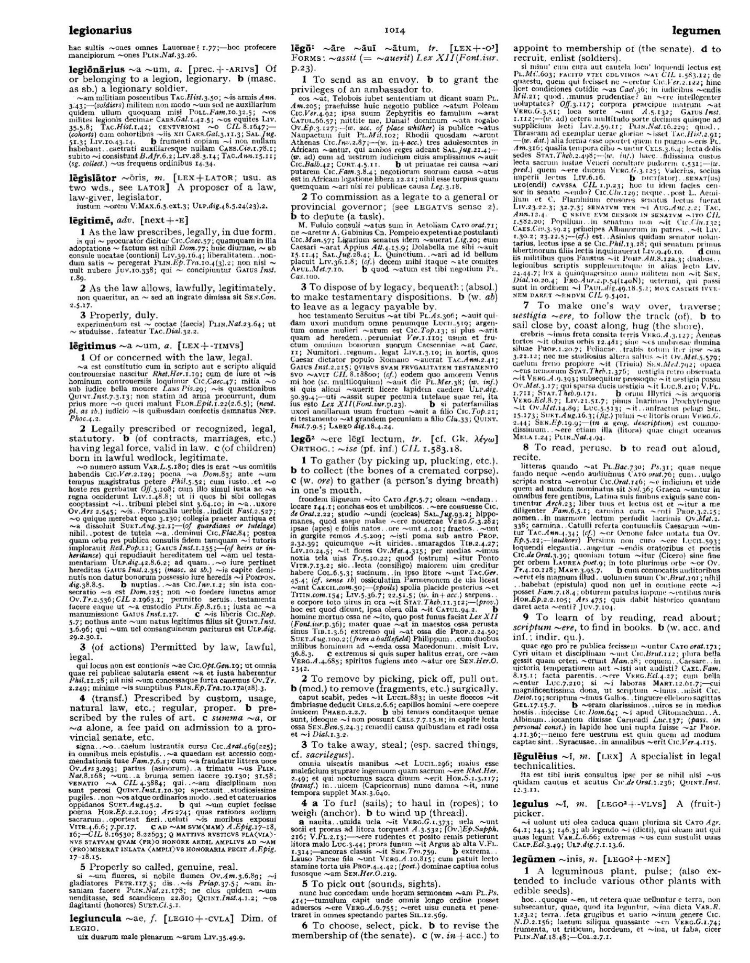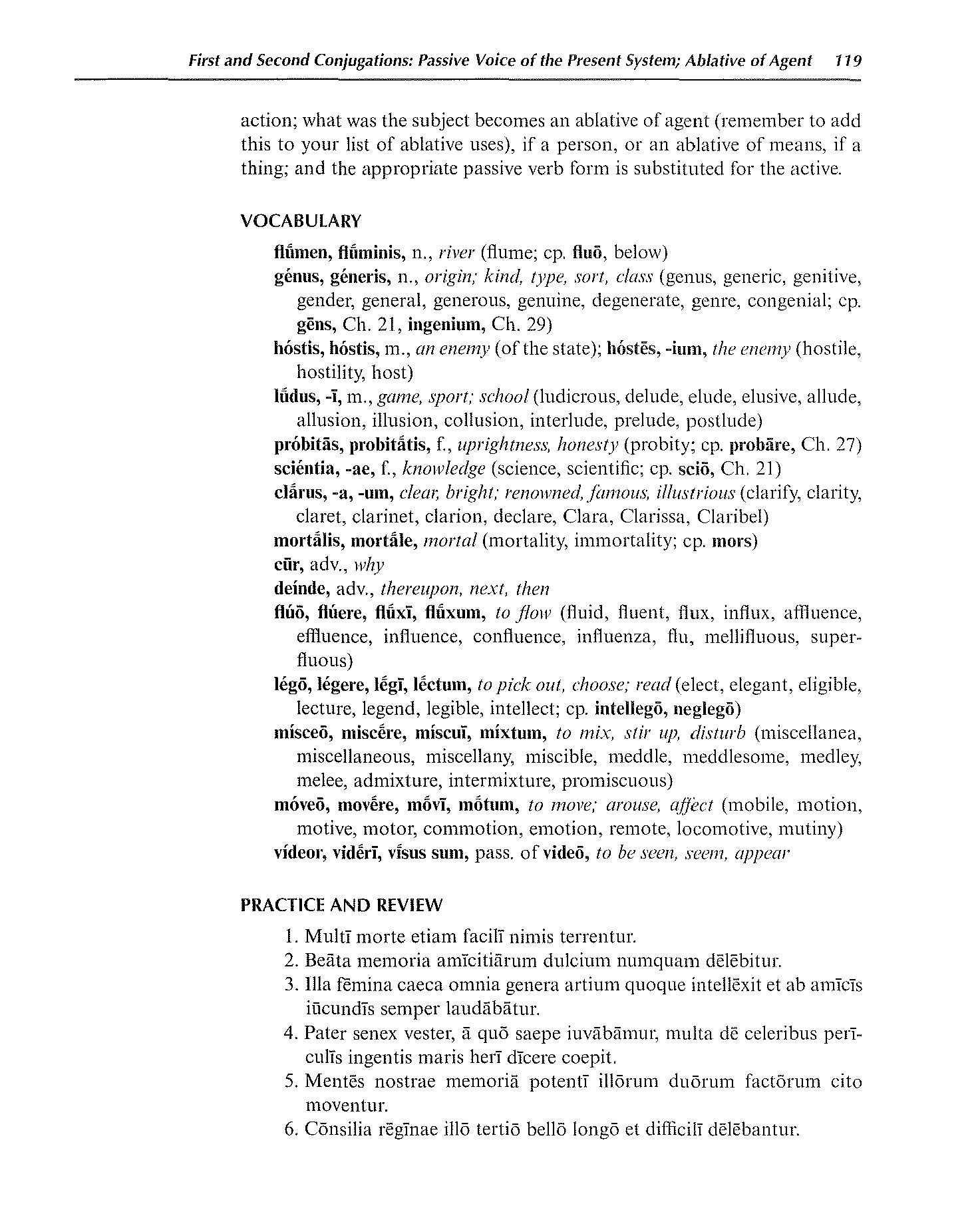
page_listing.tpl
page_subListingDetails.tpl
sub_listingDetails_style1.tpl
sub_listingDetails.title.tpl
legere to pick out
legere is a Latin Verb that primarily means to pick out.
Definitions for legere
Wheelock's Latin
Verb
- 1
to pick out, choose; read
English derivatives:
elect elegant eligible lecture legend legible intellect
Oxford Latin Dictionary
Verb
- 1
To send as an envoy.
- 2
To commission as a legate to a general or provincial governor.
- 3
To dispose of by legacy, bequeath; (absol.) to make testamentary dispositions.
- 4
To gather (by picking up, plucking, etc.).
- 5
To take away, steal; (esp. sacred things, cf. sacrilegus).
Sentences with legere
Latin to English
Optimōs librōs tantā cum cūrā lēgērunt ut multum sapientiae discerent.Compare They read the best books with such great care that they learned much wisdom.
Bonōs librōs cum cūrā legēbāmus ut sapientiam discerēmus.Compare We used to read good books with care so that we might learn wisdom.
Sī librōs bene legēs, melius scrībēs.Compare If you read books well, you write better.
Is laudatio quum lego, quis philosophus non contemno?Compare When we read that eulogy, what philosopher do we not despise?
Non dubito, quin meus litterae libenter lego.Compare I did not doubt that you would read my letter with pleasure.
Qui arbor consero, sub is lego alius fructus.Compare Another is gathering fruit under the tree which I planted.
Conjugation table for legere
Cactus2000
| ACTIVE | |
| Indicative present | Indicative imperfect |
| legō legis legit legimus legitis legunt | legēbam legēbās legēbat legēbāmus legēbātis legēbant |
| Indicative perfect | Indicative pluperfect |
| lēgī lēgistī lēgit lēgimus lēgistis lēgērunt / lēgēre | lēgeram lēgerās lēgerat lēgerāmus lēgerātis lēgerant |
| Indicative future | Indicative future perfect |
| legam legēs leget legēmus legētis legent | lēgerō lēgeris lēgerit lēgerimus lēgeritis lēgerint |
| Subjunctive present | Subjunctive imperfect |
| legam legās legat legāmus legātis legant | legerem legerēs legeret legerēmus legerētis legerent |
| Subjunctive perfect | Subjunctive pluperfect |
| lēgerim lēgeris lēgerit lēgerimus lēgeritis lēgerint | lēgissem lēgissēs lēgisset lēgissēmus lēgissētis lēgissent |
Infinitive present legere Infinitive perfect lēgisse Infinitive future lēctūrum esse | Imperative present lege legite Imperative future legitō legitō legitōte leguntō |
| PASSIVE | |
| Indicative present | Indicative imperfect |
| legor legeris legitur legimur legiminī leguntur | legēbar legēbāris / legēbāre legēbātur legēbāmur legēbāminī legēbantur |
| Indicative perfect | Indicative pluperfect |
| lēctus sum lēctus es lēctus est lēctī sumus lēctī estis lēctī sunt | lēctus eram lēctus erās lēctus erat lēctī erāmus lēctī erātis lēctī erant |
| Indicative future | Indicative future perfect |
| legar legēris / legēre legētur legēmur legēminī legentur | lēctus erō lēctus eris lēctus erit lēctī erimus lēctī eritis lēctī erunt |
| Subjunctive present | Subjunctive imperfect |
| legar legāris / legāre legātur legāmur legāminī legantur | legerer legerēris / legerēre legerētur legerēmur legerēminī legerentur |
| Subjunctive perfect | Subjunctive pluperfect |
| lēctus sim lēctus sīs lēctus sit lēctī sīmus lēctī sītis lēctī sint | lēctus essem lēctus essēs lēctus esset lēctī essēmus lēctī essētis lēctī essent |
Infinitive present legī Infinitive perfect lēctum esse Infinitive future lēctum īrī | Imperative present legere legiminī Imperative future legitor legitor - leguntor |
| PARTICIPLE | ||
| Participle present active | ||
| Nom. | legēns | legentēs |
| Gen. | legentis | legentium |
| Dat. | legentī | legentibus |
| Acc. | legentem | legentēs |
| Abl. | legente | legentibus |
| Participle future active | ||
| Nom. | lēctūrus | lēctūrī |
| Gen. | lēctūrī | lēctūrōrum |
| Dat. | lēctūrō | lēctūrīs |
| Acc. | lēctūrum | lēctūrōs |
| Abl. | lēctūrō | lēctūrīs |
| Participle perfect passive | ||
| Nom. | lēctus | lēctī |
| Gen. | lēctī | lēctōrum |
| Dat. | lēctō | lēctīs |
| Acc. | lēctum | lēctōs |
| Abl. | lēctō | lēctīs |
| Gerundive | ||
| Nom. | legendus | legendī |
| Gen. | legendī | legendōrum |
| Dat. | legendō | legendīs |
| Acc. | legendum | legendōs |
| Abl. | legendō | legendīs |
| Gerund | Supine | |
| Nom. | legere | lēctum |
| Gen. | legendī | lēctū |
| Dat. | legendō | |
| Acc. | legendum | |
| Abl. | legendō | |
Data sources
Notes
- Definitions
- Frederick M. Wheelock, Wheelock's Latin, 6th ed., rev. Richard A. LaFleur (New York, NY: HarperCollins Publishers, 2005): 119.
- P. G. W. Glare, Oxford Latin Dictionary, Vols. 1-8 (Oxford: Clarendon Press, 1982): 1014.
- Word frequencies
- Christopher Francese, "Latin Core Vocabulary," Dickinson College Commentaries, last modified 2014, http://dcc.dickinson.edu.
- Paul B. Diederich, The Frequency of Latin Words and Their Endings, PhD diss., (Columbia University, 1939).
- Louis Delatte, Suzanne Govaerts, Joseph Denooz, and Etienne Evrard, Dictionnaire fréquentiel et index inverse de la langue latine [Frequency Dictionary and Inverse Index of the Latin Language] (Liège, Belgium: Laboratoire d'analyse statistique des langues anciennes de l'Université de Liège [L.A.S.L.A.], 1981): 123.
Bibliography
Allen, Joseph H. Allen and Greenough's New Latin Grammar for Schools and Colleges: Founded on Comparative Grammar. Edited by James B. Greenough, George L. Kittredge, Albert A. Howard, and Benjamin L. D'Ooge. Boston, MA: Ginn & Company, 1903.
Crystal, David. A Dictionary of Linguistics and Phonetics. 6th ed. Oxford, UK: Blackwell Publishing, 2008.
Delatte, Louis, Suzanne Govaerts, Joseph Denooz, and Etienne Evrard. Dictionnaire fréquentiel et index inverse de la langue latine [Frequency Dictionary and Inverse Index of the Latin Language]. Liège, Belgium: Laboratoire d'analyse statistique des langues anciennes de l'Université de Liège (L.A.S.L.A.), 1981.
Diederich, Paul B. The Frequency of Latin Words and Their Endings. PhD diss., Columbia University, 1939.
Francese, Christopher. "Latin Core Vocabulary." Dickinson College Commentaries. Last modified 2014. http://dcc.dickinson.edu/latin-vocabulary-list.
Gildersleeve, Basil L., and Gonzales Lodge. Gildersleeve's Latin Grammar: Third Edition, Revised, and Enlarged. 3rd ed. London, England: Macmillan and Co., 1903.
Glare, Peter G.W. Oxford Latin Dictionary. Vols. 1-8. Oxford, England: Clarendon Press, 1982.
Krüger, Bernd. "Latin Conjugation Tables." Cactus2000. Accessed May 5, 2023. https://latin.cactus2000.de/index.en.php.
Pierson, Nick. "Sound of Text." Accessed October 26, 2019. https://soundoftext.com.
Wheelock, Frederick M. Wheelock's Latin. 6th ed. Revised by Richard A. LaFleur. New York, NY: HarperCollins Publishers, 2005.
Wiktionary Contributors. "Victionarium." Wikimedia Foundation, Inc. Updated March 18, 2019. https://la.wiktionary.org/wiki/Victionarium:Pagina_prima.
Citation
Chicago (17th ed.)
Allo Contributors. "legō, legere, lēgī, lēctum (v.) - Latin Word Definition." Allo Latin Dictionary. Last modified . Accessed February 19, 2026. http://ancientlanguages.org/latin/dictionary/lego-legere-legi-lectum.
Entry created on . Last updated on .







